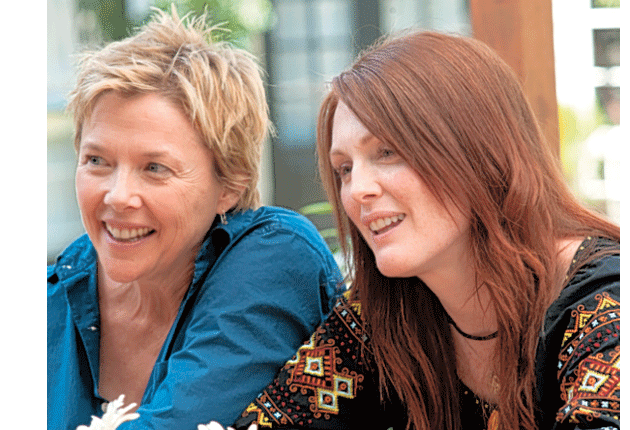Amy Jenkins: The real drama of couples who have been together a long time

"Go easy with the wine," says one half of an irritable couple to the other. "Go easy with the micro-managing," comes the reply. And there you have it. Marriage. In a nutshell.
One of you is on the uptight half of the spectrum; the other is more relaxed. This is probably what attracted you to each other in the first place. When you met, you liked the way your love object could throw themselves into a party. And they liked the way you never missed a train. But now it's another matter. "Marriage is hard. Two people year after year. Sometimes you stop seeing each other."
The dialogue above was written by Lisa Cholodenko, whose new movie, The Kids Are All Right, opened this week. Not only is it a feel-good (and sometimes bad) rom-com about a long-term relationship (when did you last see one of those?), but also about a lesbian relationship which is depicted with an entirely abnormal sense of normality. Add these factors together and Cholodenko has pulled off a double whammy of innovation. The whole thing is utterly refreshing. The most refreshing thing of all is that the film doesn't shy away from those three little words that mean so much: marriage is hard. What is more, it's a long haul. It's a struggle. There's blood on the walls.
Nic and Jules (Annette Bening and Julianne Moore) are a gay couple with a child each from the same anonymous sperm donor. They have been together 20 years and the marriage has fallen into well-worn grooves. They use porn (gay male porn, oddly enough) to get their sex life going; one of them drinks a little; they have issues over who brings home the bacon. The plot is stirred by the arrival of the biological father of their nearly grown-up children, but the real issue is the dynamic between the two leads. Where a standard issue romantic comedy would be "will they or won't they get together?", this is "will they or won't they stay together?". And it turns out to be just as dramatic a subject – which makes you wonder why you see it so much less often.
Most relationship films take us to the first kiss or to the altar but prefer to wrap things up at that point with a cheery nod to the happy ever after. Perhaps this is a function of genre; novels, after all, with their less rigorous story structures, take on the idiosyncrasies of marriage more often. But then a film like The Kids Are All Right comes along and disproves the genre theory. I think it's much more likely that popular culture is reluctant to examine the challenges of long-term relationship for fear the subject would be, well, unpopular. We just don't want to hear it.
Whenever I write about marriage being hard (and, yes, people in marriages love each other too – but isn't the hard bit much more interesting?), I get a letter or two from people who feel terribly sorry for me. They assure me that they have had endlessly long, endlessly nourishing, fragrant and loving marriages. Either this is not true – in which case, save the green ink – or it is true, in which case I can't help wondering what these people have had to sacrifice. Their selves possibly. The letters are like a literary version of Radio 2 on a Sunday morning where couples who have been together for 40 years dedicate a song to each other and swear they feel exactly the same now as when they first heard it. That's how invested we are in the idea of marriage being the proverbial bed of roses. But do we really want to be in our own personal Love Story: The Movie? Personally I'd prefer to be in the Cholodenko-inspired version: Love is having to say you're sorry over and over again.
Join our commenting forum
Join thought-provoking conversations, follow other Independent readers and see their replies
Comments